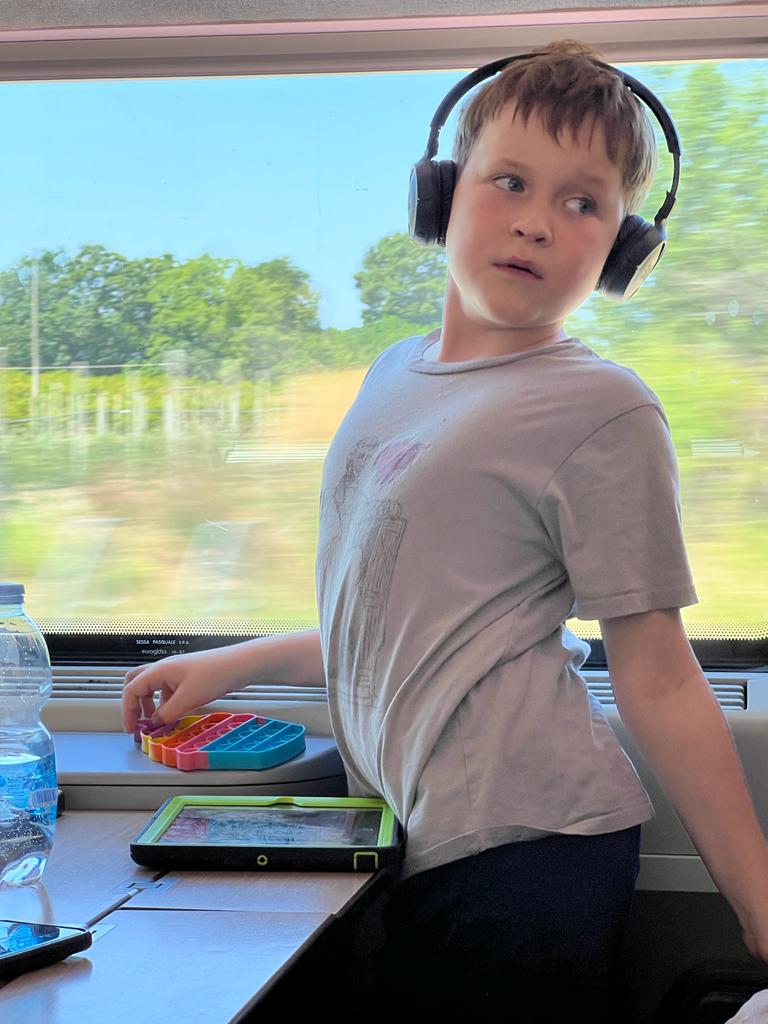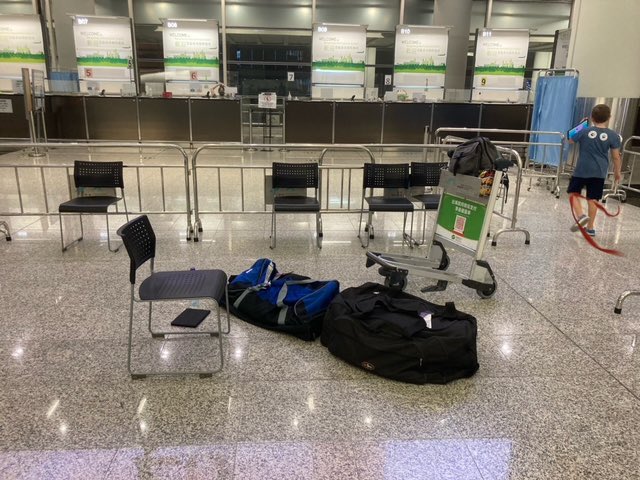A nine-year-old boy with disabilities was forced to sleep on the cold, hard floor of Hong Kong’s airport as health authorities took nearly a day to grant him an exemption to quarantine at home after his arrival.
His mother is calling on the government to make its Covid-19 quarantine policies more friendly to people with disabilities, such as by approving exemptions for such cases ahead of their flights.
Speaking to Coconuts on Wednesday, the child’s mother, Mary, who asked to be identified by just her first name, said she, her two sons and her husband flew in on Monday after a trip overseas to visit their family, whom they had not seen for over three years.
As her younger son, who is a Hong Kong native, has severe autism, attention deficit hyperactivity disorder (ADHD) and a speech impairment, Mary said she and her husband had petitioned the Department of Health about a month before the flight to grant the child an exemption to quarantine at home.
“According to his doctors, being confined to a small room would lead to self-harm, harming others and escaping quarantine, and we fully documented this in our petition to the department, “ she said, adding that there had been incidents when he ran out into a hallway corridor on his own — something they did not want to repeat by staying in a quarantine hotel room.
Mary, who has lived in Hong Kong for close to 19 years, added that they submitted diagrams of their home, its size and full personal details of all the caregivers for their son to the authorities before the trip back.
However, the department refused to grant an exemption prior to the arrival, she said.
The family decided to go ahead with the flight to Hong Kong and planned to get an exemption upon arrival as the school year for their sons had already started.

The family arrived in Hong Kong at 3pm on Monday. Mary and her older son began their quarantine at a designated hotel, while her husband and younger son waited in the airport for an exemption to be approved.
Mary said her husband made multiple petitions, with the case being transferred from one person to another because “no government employee would make a decision”.
This resulted in her husband and son having to sleep on the cold, hard floor of the airport overnight. They decided to stay in the airport instead of going to the quarantine hotel as they awaited the government’s decision due to concerns about their son’s claustrophobia raised by his doctors.
But as it was getting very uncomfortable for her husband and son, they decided to go to the quarantine hotel at 4am on Tuesday as “being forced to sleep on a concrete floor because bureaucrats refused to make a decision was inhumane punishment,” she quoted her husband as saying.
At around 11:30am on Tuesday, 20.5 hours after the family arrived in Hong Kong, the Department of Health informed them that Mary’s son and husband were granted an exemption to quarantine at home.
While Mary said she is glad that the situation has been resolved, she hopes that the government can look into granting such exemptions ahead of flights for people with disabilities.
“We’re hoping that others can get the exemption approved before arriving in Hong Kong,” she said, adding that uncertainty like this is stressful for people with disabilities and their family members.
She also said that it is not new for quarantine exemptions to be made beforehand, as in the case of the parents of the dancer who was severely injured at Mirror’s concert in July who had their permission to temporarily leave their hotel quarantine to visit their son in the hospital approved before they flew in from Canada.
Mary also called for more consideration for the quarantine arrangements for people with disabilities, which have deterred many from returning to Hong Kong.
“One particularly difficult incident was when a Department of Health officer asked why our son arrived in Hong Kong given the quarantine requirement,” she said.
“Given he was born in Hong Kong, his father is a Hong Kong citizen and this is his home, he has a legal right to return. We were surprised by this line of questions. It is a human right to be able to return to your residence, even if you are disabled.”
Arrivals to Hong Kong generally have to quarantine in designated hotels for three days before undergoing medical surveillance at home or in hotels for four more days.




